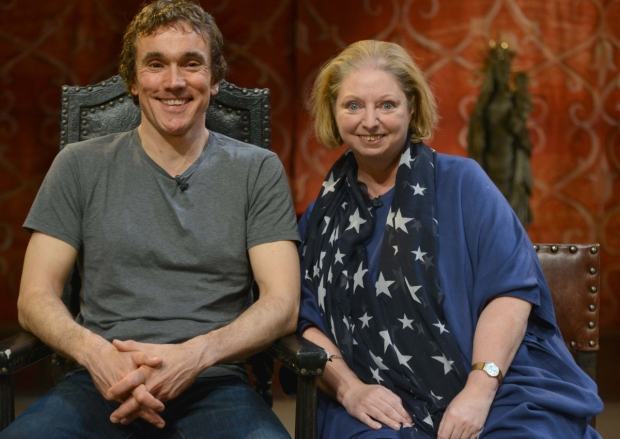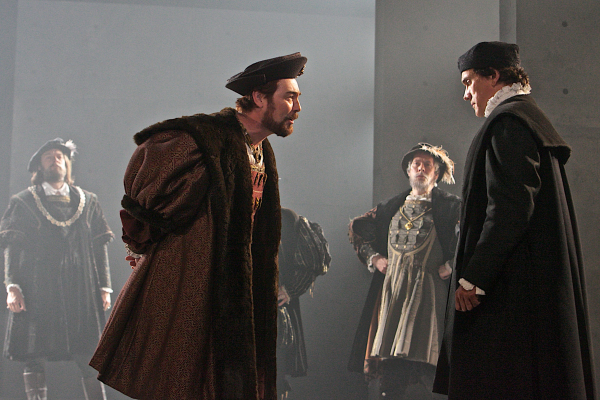Hilary Mantel and Ben Miles on bringing The Mirror and the Light to the West End
The final part of the ”Wolf Hall” trilogy arrives in London this autumn

© Jeff Overs, BBC 2
The news is out – the third part of Hilary Mantel Wolf Hall trilogy – The Mirror and the Light – is coming to the West End this autumn, with Jeremy Herrin once more returning to direct.
For theatre fans and historical fiction lovers everywhere – this is brilliant news: the first two parts of the show were a masterclass in adaptation from page to stage. This time around things are slightly different – Ben Miles, who previously led the stage show, will now join Mantel in co-writing duties. Miles also recorded the audio book version of The Mirror and the Light ahead of its release last year – a marathon 38-hours of meaty Mantel text.
For the uninitiated, the Wolf Hall trilogy, composed of Wolf Hall, Bring Up the Bodies and The Mirror and the Light follows a rather significant statesman – Thomas Cromwell. Supplanted a century later as the most famous Cromwell in history by a certain Oliver, Thomas was a courtier under Henry VIII, overseeing the massive ecclesiastical transformation of Britain while also juggling the financial and romantic issues facing his Majesty (the two issues were largely intertwined), before being utterly eviscerated by his aristocratic rivals and having his life's work pulled down around him.
Chatting to Mantel and Miles on Zoom, it's hard not to be slightly intimidated: Mantel is, after all, perhaps one of the most revered authors of the age, and, as an early modern history nut, the oddest case of being star struck may have swept over me.
But, a blustery compliments later, it was on with the show – discussing the exciting prospect of seeing Cromwell's story completed in the West End. Mantel says: "It does feel like a fresh venture. In one way I'm conscious of how much time has passed since I started the project in 2005. When I was writing the books it always seemed to be winter, or twilight. But you come out of the other side of writing the books with a whole new life, and I feel very excited by that next stage."
There's an unusual, symbiotic relationship between The Mirror and the Light on page and its stage iteration. Mantel was penning the final part of her trilogy while in rehearsals for Wolf Hall and Bring Up The Bodies, which premiered in Stratford-upon-Avon in the winter of 2013 before transferring to the West End and appearing on Broadway. Miles was there throughout it all, Mantel explains: "As well as working on the book during rehearsals, as I was writing it I was sending swathes of text onto Ben. Somehow he was finding time to pay attention to it. He became my natural first reader, we've been on this journey together."

© Francis Loney
For Miles, working on the audio book also aided the eventual adaptation: "Reading the third novel was the perfect opportunity to immerse myself in the world of it and then draw from that experience when approaching the nuts and bolts of dialogue, scenes and sequences. It helped to bring into sharp focus everything that we chose to be our version of the novel." Historical moments on offer including the birth of Edward VI, Henry's deeply sought-after son, as well as the famous Pilgrimage of Grace, the moment where, in Mantel's words, "the status quo is most under threat".
Having spent 38 hours absorbing the audio book, what's clear is that Cromwell spends a large amount of time mulling over questions of performance – either his own as a courtier, assuming roles such as the "Earl of Essex" or "Lord Privy Seal" as well as the King's performance – as a monarch, elected by God. Did those things play well into the stage production, I ask Miles: "It's a rich, retrospective novel – it's concerned with looking back and re-examining a version of oneself. There are wonderful moments in the book where Cromwell's idea of who he is or who he was is challenged by people who he wasn't expected to do that."
Mantel adds: "Cromwell is still capable of surprising himself and is capable of being surprised. Though he's set himself on an upward climb to power over many years, there is a moment when he's astonished about being kicked several rungs up a ladder. You'd think going the other way would surprise someone – a sudden sliding down the snake. His trajectory is not under his control. His plot for his life can be furthered or defeated by the king in any scene – and Cromwell (and the audience) never know which it is to be."
How do you write a play grounded in history where people know how Cromwell's story pans out? Mantel finds it thrilling: "I think it heightens the tension. People are walking beside the characters who do not know what is going to happen. That tension keeps rising as you know your character is moving towards their doom. The audience witnesses directly the impact: they see the actor's face the moment the game is up, or when revelations break in. Equally they could be oblivious, unconscious of what's around the corner. We all see plays like Romeo and Juliet, but knowing that it's a tragedy never detracts from seeing them walk towards their fates."
Miles played Cromwell both in Stratford, in the West End and on Broadway in what was a colossal performance – having less than a minute off stage thereabouts throughout both parts. Mantel says that Miles might get a bit more time off-stage, saying: "We've been a bit more flexible and not entirely observed the convention that Cromwell has to be on stage at all times: you get about 60 seconds off stage this time instead Ben."
Does this mean the beginning of the end for Mantel's relationship with her sixteenth century subject? Mantel was wonderfully enigmatic, echoing her own text: "There are no endings, just beginnings. And this is one."












